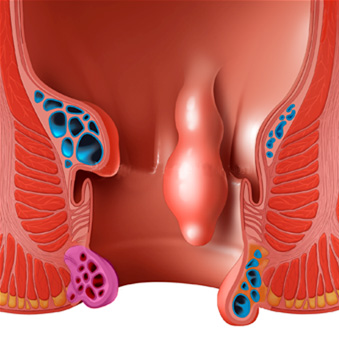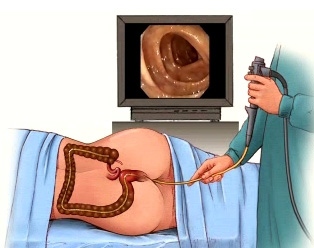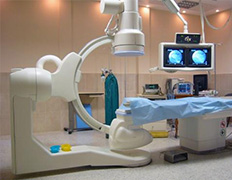Rectal Polyp
Colonic polyps, also known as colorectal polyps, are growths that appear on the surface of your large intestine, or colon. You can have more than one polyp, and they may be flat or raised, benign or cancerous. According to the National Institute of Diabetes and Digestive and Kidney Diseases, polyps that are flat may are more likely to be cancerous in comparison to raised polyps. (NIDDK)
 Although polyps may sometimes be an indicator of colon cancer, it is important to distinguish these two conditions: Not everyone who has polyps will also develop colon cancer. However, removing potentially cancerous polyps may reduce your risk of developing colon cancer.
Although polyps may sometimes be an indicator of colon cancer, it is important to distinguish these two conditions: Not everyone who has polyps will also develop colon cancer. However, removing potentially cancerous polyps may reduce your risk of developing colon cancer.
Colonic polyps, also known as colorectal polyps, are growths that appear on the surface of your large intestine, or colon. You can have more than one polyp, and they may be flat or raised, benign or cancerous. According to the National Institute of Diabetes and Digestive and Kidney Diseases, polyps that are flat may are more likely to be cancerous in comparison to raised polyps. (NIDDK)
Although polyps may sometimes be an indicator of colon cancer, it is important to distinguish these two conditions: Not everyone who has polyps will also develop colon cancer. However, removing potentially cancerous polyps may reduce your risk of developing colon cancer.
What Causes Colonic Polyps and Who Is at Risk?
Doctors are not sure what causes colonic polyps. When polyps are cancerous, they may be linked to colon cancer though this is not the sole cause of the polyps.
However, having certain risk factors and engaging in some unhealthy behaviors are thought to make colonic polyps more likely.
You may have a higher risk if:
- you have a family history of polyps or colon cancer
- you have had polyps previously
- you have had ovarian or uterine cancer before the age of 50
- you are 50 years old or over
Unhealthy behaviors that may contribute to the growth of colonic polyps include:
- smoking
- being overweight
- drinking alcohol
- exercising infrequently
- eating a diet rich in fats
If you make lifestyle changes to address these behaviors, you may be able to reduce your risk. Additionally, regularly taking a low dose of aspirin and adding more calcium to your diet may help prevent polyps. Your doctor may have other suggestions for reducing your risk
What Are the Symptoms of Colonic Polyps?
Symptoms of colonic polyps vary. You may not have any symptoms. Sometimes, you will not know you have a polyp until your doctor discovers it during a physical exam or while performing tests for other conditions. However, some noticeable symptoms may include:
- blood in your stool
- diarrhea or constipation that lasts longer than a week
- anal bleeding
If you have seen blood on the toilet paper or your underwear after a bowel movement, it may indicate anal bleeding. If you have blood in your stool, your stool may appear to be black or have red streaks.
Symptoms of colonic polyps vary. You may not have any symptoms. Sometimes, you will not know you have a polyp until your doctor discovers it during a physical exam or while performing tests for other conditions. However, some noticeable symptoms may include:
- blood in your stool
- diarrhea or constipation that lasts longer than a week
- anal bleeding
If you have seen blood on the toilet paper or your underwear after a bowel movement, it may indicate anal bleeding. If you have blood in your stool, your stool may appear to be black or have red streaks.
Diagnosing and Treating Colonic Polyps
Your doctor may use a combination of tests to discover if you have colonic polyps. These tests may include:
- colonoscopy—a camera on a flexible tube is threaded through the anus to view the rectum and colon
- sigmoidoscopy—similar to colonoscopy but shows only the rectum and lower colon
- barium enema—an X-ray of the colon after it is injected with barium, which helps make images more visible
- computed tomography (CT) scan—a tube with a camera, X-rays, and computers work together to create images of your large intestine. This is sometimes called a virtual colonoscopy.
- stool test
 One of the procedures done to confirm a diagnosis of colonic polyps is the same one used to treat them. Polyps are removed during a colonoscopy. The colonoscopy tube has a polyp-removal tool in addition to a camera. Doctor will usually remove any polyps they find as they are checking the large intestine. Polyps are then tested for cancer unless your doctor has already determined that they are benign.
One of the procedures done to confirm a diagnosis of colonic polyps is the same one used to treat them. Polyps are removed during a colonoscopy. The colonoscopy tube has a polyp-removal tool in addition to a camera. Doctor will usually remove any polyps they find as they are checking the large intestine. Polyps are then tested for cancer unless your doctor has already determined that they are benign.
Your doctor may use a combination of tests to discover if you have colonic polyps. These tests may include:
- colonoscopy—a camera on a flexible tube is threaded through the anus to view the rectum and colon
- sigmoidoscopy—similar to colonoscopy but shows only the rectum and lower colon
- barium enema—an X-ray of the colon after it is injected with barium, which helps make images more visible
- computed tomography (CT) scan—a tube with a camera, X-rays, and computers work together to create images of your large intestine. This is sometimes called a virtual colonoscopy.
- stool test
One of the procedures done to confirm a diagnosis of colonic polyps is the same one used to treat them. Polyps are removed during a colonoscopy. The colonoscopy tube has a polyp-removal tool in addition to a camera. Doctor will usually remove any polyps they find as they are checking the large intestine. Polyps are then tested for cancer unless your doctor has already determined that they are benign.
What Are Recovery Expectations For Colonic Polyps?
Colonic polyps are usually noncancerous and are considered harmless. Removing polyps may reduce or eliminate any related symptoms you were experiencing and may help to prevent colon cancer in the future. Bothersome symptoms may indicate a more serious condition, such as colon cancer. After you have polyps removed, your doctor will recommend that you get tested for them regularly.
Our Expertise in Medical Services
Rana Hospital was started with a dream of providing the best facilities for Piles, Fissures, Fistula and all Anorectal problems.

Mon to Sat:
8:30 AM – 1:30 PM
4:00 PM – 6:30 PM
Mon to Sat:
9:00 AM – 1:30 PM
4:00 PM – 6:30 PM
Make an Appointment
 Accreditation & Awards
Accreditation & Awards
The Hospital organized a free checkup camp for PILES on 24th October 2013 in which 717 patients from all over India were examined. It was followed by one day free operation camp on 27th October 2013. Dr Suri single-handedly performed 391 free surgeries in 8 hours & 45 minutes setting a World Record.




